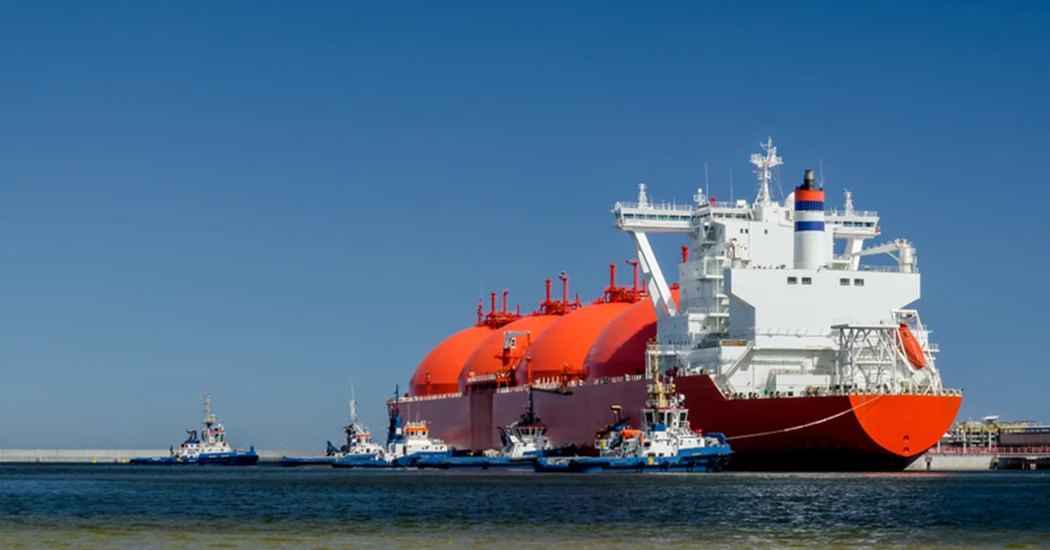US-Qatar LNG dreams in Europe is not the solution
Global media has been buzzing in the past few weeks with a so-called US LNG tsunami hitting European gas markets, in a move to counter the European energy crunch.
Optimism about the effects of US LNG is high, mainly to counter a possible natural gas shortage due to lack of Russian gas. Overall, European gas storages are still way below their historic levels, mainly due to dwindling Russian gas supplies in the past months. At the same time, the Ukraine-Russia crisis is looming over the market, and a possible Russian incursion in parts of the Ukraine is still expected. Washington is also pushing other LNG exporters, mainly Qatar, to consider a possible higher supply to the EU in a move to quell threats to the latter’s fledgling energy market situation. When looking at current EU gas prices, optimism is linked to a clear slump in consumer gas prices, but it doesn’t reflect the fact that existing price levels are still way above normal market price conditions.
Where the market still seems to be totally lost is the fact that LNG supplies are never going to be sufficient enough to counter a total loss of Russian gas pipeline supply in the case of a Russian-Ukrainian military conflict.
As analysts already have stated in the last weeks, total global US LNG exports in 2021 amounted to 66.32 million tons (which is equivalent to 91.46 bcm of piped gas) or 10 percent of the entire US gas production. When taking the position that all US LNG exports would have gone in 2021 to the EU, this would have meant only 35.83 percent of Russian gas exports to the EU amounting to 185.1 bcm in 2021. Considering at the same time all the other options, which includes Qatari-Australian LNG or Norway-Dutch gas supplies to the EU, the total output is still not sufficient to counter the growing thirst for Russian pipeline gas. The current situation, as most believe due to Putin’s power push for Nordstream2 and a possible drive to get back in place long-term gas contracts, has made clear that Europe’s energy security is very weak. The Ukraine-Russian crisis also shows that Moscow is not willing or interested in increasing overall natural gas pipeline volumes via Ukraine anymore. Any interruptions to Russia’s gas supply to Europe would exacerbate an energy crisis caused by a shortage of the fuel. At present, the EU depends on more than 40 percent of its natural gas supply from Russia.
Citibank already has calculated that if European LNG import/regassification was maxed out, the latter will be only able to replace around two-third of Russian pipeline imports. The latter LNG supply, however, needs a coordinated EU government approach as otherwise these volumes are not going to be available, especially not on a short term. Possible flexibility is expected, as part of a spot-market, but also depending on existing contractual obligations and logistics.
When looking at the EU LNG regassification options, another major constraint is already in the market. The geographical access options for LNG to European markets is largely constrained, since NW Europe has a vast gas infrastructure available, but the demand is far away from it. Another main LNG regassification hub is the Iberian Peninsula, with a vast range of plants, but no existing interconnection again with markets in despair in this case within the European Union. Spain’s LNG regassification is large, but it is almost an island in itself.
Even though the spectre of a devastating European ground war is not yet on the horizon, possible military clashes are not ruled out. A Russian incursion into Ukraine or maybe into parts of the Russian militants held areas are already expected. Moscow’s strategic military maneuvering is also showing its appetite to include Belarus, and some fear even a move towards the Baltic. European and global financial markets are still very quiet about the possible effect, but whatever move Putin is making that will rattle Western politicians it will put Europe under extreme pressure.
The statements made by US President Joe Biden or several of his European counterparts have been met by Russian arrogance. Biden’s remarks last week regarding a small incursion of Russian troops into Ukraine have been met by vigorous opposition. European countries also are showing not to be able to present a strong front to counter Putin at present. Germany, as Europe’s strongest economy and political power player, looks to be trying to set up a Chamberlain 2.0 approach. Berlin is afraid it will be put into the crossfire of Russia, as it is not only seen by Moscow as the prime partner in Europe, but also is fully dependent on Russian gas supplies. Putin’s game of chess on several tables is playing out very well.
Germany is the weak link in all. Due to its EnergieWende, which has failed, and the lack of political will to invest in nuclear power generation, Germany is facing supply and infrastructure problems. The country has also not pushed for additional LNG regassification plants, so it largely depends on others in case of emergency. The country currently has no LNG terminal of its own. Taking this into account, Germany is the biggest buyer of Russian gas in the world. It draws more than half of its gas imports from Russia against around 40 percent on average for the European Union, according to the EU’s statistics agency Eurostat. Berlin’s links to Russia are immense, larger than most expect.
Reality will show what will be popping up out of the hat of Putin, but it seems it is going to be another Crimean or Georgian play.
By dividing NATO-Washington-EU, Putin already has weakened the possible reaction. A possible call by Russian groups in Eastern European countries on Moscow to come to their rescue will be done swiftly and most probably without a real conflict. The West’s reaction, based on proposed sanctions by Washington or the EU, are not going to deter Putin’s Soviet Union dream. The main sector to be hit first is energy, as sanctions without an end to Russian gas supplies are not going to hurt Moscow or Putin. For European energy markets, a sanctions or military crisis will have the same effect: not enough gas available or in storage. LNG is not going to solve the situation at present, or not even within a year.
Statements made by Washington that they would attempt to exempt energy from a crippling package of financial sanctions currently being prepared, is again giving Putin a free card. If market forces start to realise that geopolitical risks are real, this time not only on the front-page of NYT, FT or Le Figaro, but on the ground, price hikes are to be expected. The latter will only bring profits to a few, as potential gas supply to Europe will be in shambles. Higher EU prices will directly push other markets up too.
Energy Connects includes information by a variety of sources, such as contributing experts, external journalists and comments from attendees of our events, which may contain personal opinion of others. All opinions expressed are solely the views of the author(s) and do not necessarily reflect the opinions of Energy Connects, dmg events, its parent company DMGT or any affiliates of the same.






